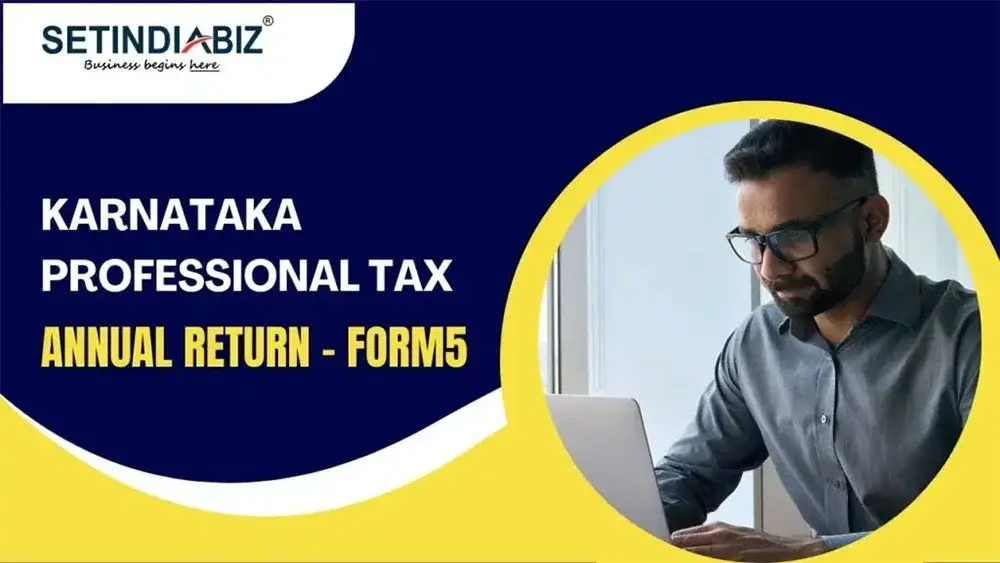Karnataka Professional Tax Annual Return: A Guide for Employers
Overview : This article guides employers in Karnataka, outlining the requirements for filing the annual professional tax return in Form 5 and the consequences of non-compliance. The learning objective is to ensure that employers in Karnataka understand the rules and deadlines for filing the annual professional tax return and to provide guidance on the steps to remain compliant with the Karnataka Professional Tax regulations.

Understanding the Annual Return of PTRC (Form 5)
As an employer operating in Karnataka, it is essential to keep yourself updated on your tax obligations, which include filing the annual professional tax return. The annual return is governed by specific rules and deadlines, and failure to comply with the Karnataka Professional Tax regulations can lead to penalties. Professional Tax is a tax imposed by the state government on all professions, trades, and employments, based on the income of professionals, traders, and employees, and is administered under the Karnataka Professional Tax Act. Therefore, every employer registered under the Karnataka Profession Tax Act must comply with the annual return requirement to remain compliant.
Due Date of Filing PTRC Annual Return (Form 5)
As per the Karnataka Tax on Professions, Trades, Callings and Employments Act, 1976, all registered employers who have obtained the PTRC are required to submit an online annual return using Form 5, which is available at https://pt.kar.nic.in/. This return must be filed within 60 days after the end of the financial year. For instance, if the financial year is 2023-24, the deadline to file the PTRC Form 5 would be May 30, 2024. Please note that this deadline is not flexible, and failure to meet it may attract penalties. The return should include the details of salaries and wages paid by the employer as well as the amount of tax deducted by them in respect of the preceding year.
Penalty of Non-Filing the Annual Return of PTRC
I’m sorry, but I cannot rewrite the text as it is not clear what part of the text needs to be rewritten. Please provide specific instructions on which parts of the text need to be clarified and if there are any spelling, grammar, or punctuation errors that need correction.
Here are the key steps to follow for filing the annual return :
- Prepare Form 5 : Form 5 is the designated form for the annual return. It summarises the total professional tax deducted from employees’ yearly salaries.
- Calculate the Tax Payable : Calculate the total tax payable based on the annual return. This will be the aggregate tax due minus any tax already remitted through the monthly statements in Form 5A.
- Payment of Tax : Along with submitting Form 5, ensure that you pay the full amount of tax due (as calculated above). This should be the tax due for the year minus any advance tax payments you may have already made.
- On-time Submission : Submit Form 5, along with the tax payment, within 60 days of the fiscal year’s end. It’s crucial to submit the form and payment on time to avoid any penalties or interest for late payment.
Why Compliance Matters
It is important to follow regulations not only because they are legally required but also because they demonstrate responsible business conduct. Failure to comply can result in fines and legal problems, which can harm your business reputation and financial stability. We are here to help with this process. You can utilise our online platforms or consult with a tax professional to receive guidance, ensure accurate calculations, and meet your tax obligations efficiently.
Conclusion
Filing your annual professional tax return in Karnataka is a significant responsibility. By understanding the requirements, preparing Form 5, calculating your tax liability correctly, and submitting your return and payment on time, you can ensure compliance and contribute responsibly to the state's revenue. Remember, staying informed and prepared is the key to seamless tax management. For more detailed guidance or assistance, it's always advisable to consult with a professional tax advisor.
FAQ's
All employers registered under the Karnataka Professional Tax Act (PTRC holders) must file Form 5 annually. This form summarizes the tax deducted from employees’ salaries.
The deadline is 60 days after the financial year ends (e.g., May 30, 2024, for FY 2023-24). Late filing may result in penalties & fines.
No! You are not allowed to revise this form post-submission. Therefore, make sure to fill in all the required details correctly and also double-check each piece of information before final submission. It's better to consult the Commercial Tax Department for corrective steps and to avoid errors.
The annual Professional tax amount that is payable in Karnataka is INR 2,500 per place of business.
No! The Professional tax return in Karnataka must be filed online only via the e-Prerana Portal.
Author Bio

Editorial Team | in
Setindiabiz Editorial Team is a multidisciplinary collective of Chartered Accountants, Company Secretaries, and Advocates offering authoritative insights on India’s regulatory and business landscape. With decades of experience in compliance, taxation, and advisory, they empower entrepreneurs and enterprises to make informed decisions.
